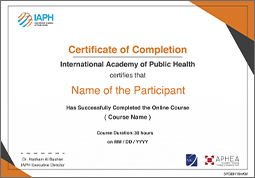Epidemiology of communicable diseases
Description
Epidemiology and biostatistics are powerful tools at the hand of public health specialists and clinicians. With epidemiological and statistical principles and methods one can measure health and disease status, assess the burden of diseases in an area, prioritize for control, and assess the effectiveness of interventions.
This course covers basic principles and methods of epidemiology and biostatistics and their use in assessing causation, burden of disease, and sensitivity and specificity of diagnostic tests. It also introduces participants to the different study designs.
Learning Outcomes
- Use epidemiological and statistical methods to assess the burden of diseases
- Apply the epidemiological approach to disease causation and evaluation of the effectiveness and efficiency of health care
- Describe the common causes of death, disease, and disability in an area or community
- Effectively manage, analyze, report, and present collected data
- Identify the strengths and limitations of epidemiological study designs
- Basics principles of epidemiology
- Basics principles of biostatistics
- Measuring health and disease
- Causation in epidemiology
- Surveys and surveillance
- Health Information System and vital statistics
- Data presentation
- Concept of effectiveness and efficiency
- Sensitivity and specificity of diagnostic tests

Duration:
30 Learning Hours
Accredited By:


Certificate

Are you interested in the course?
Get notified once the course is open by clicking on
Epidemiology of communicable diseases
Thank you for registering your interest! We appreciate your enthusiasm for this course. As soon as it becomes available, we will reach out to you with all the details. Stay tuned!